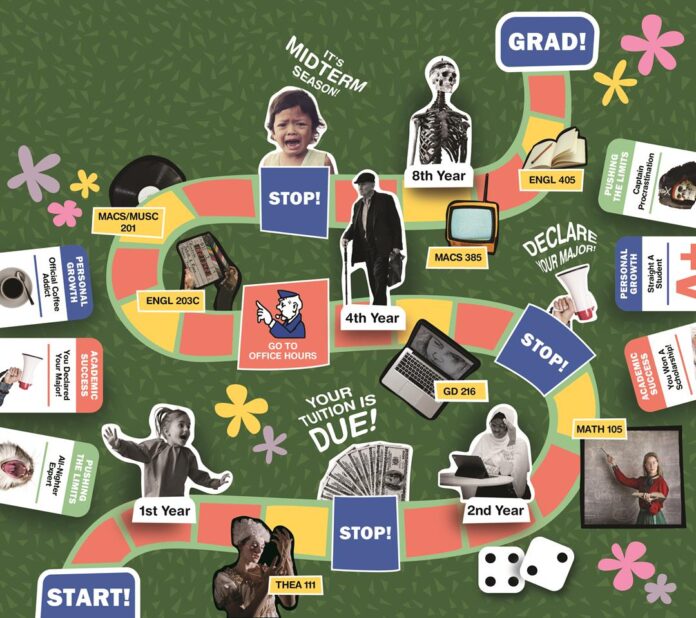In just a few short weeks, course registration will open for the Winter 2023 semester. We know how overwhelming registration can be. Fresh-faced first years can find the sheer list of options overwhelming, while third and fourth years could be filling out their elective requirements, waiting on a key class to come back into rotation.
With that in mind, The Cascade decided to reach out to our staff and contributors, to inquire about courses they have taken that stood out to them as particularly unique, valuable, or simply enjoyable. Whether you’re a fledgling student still finding your academic path, or a weary and burned-out undergrad in need of a break, you’re likely to find a course in the list below that will pique your interest.
University doesn’t have to be a straight-line from high school aspirations to career goals — I’d actually argue that it shouldn’t be. Let this list of course recommendations serve as a divergence — a departure from the prolonged march through the post-secondary landscape. Like J.R.R. Tolkien wrote: “Not all those who wander are lost.”
Look Out For
ENGL 271C: Laughing Matters — Rhetoric and Stand-Up Comedy
Prerequisite(s): Any two 100-level English courses numbered ENGL 105 or higher
By Brad Duncan
If you’ve got your sights set on an arts degree, you’re likely going to be writing a lot of papers, and if you’re writing papers, it’s a safe bet that a course in rhetoric will strengthen those papers. Rhetoric is a valuable tool in the arsenal of anyone who wants to persuade someone or win an argument, but learning this art of persuasion doesn’t have to be dull and dreary. The world of comedy has some of the world’s great rhetoricians — those who can construct an argument and convey their position in a manner that is approachable, disarming, and hilarious.
You’re not going to learn how to be a stand-up comedian in this course, nor will you have to perform a side-splitting ‘tight five’ in lieu of a final exam. What you will do, is draw from some of stand-up’s most prolific comics, deconstruct their arguments, and parse out how rhetorical devices can be applied to the business of being funny. Whether the laughs come from the musical stylings of Bo Burnam, the family-friendly observations of Jerry Seinfeld, or the journalistic satire of John Oliver, these comedians all share a commonality: the ability to persuade their audience — to laugh, to think, and to challenge. Plus, you get to watch stand-up in class. It’s a win-win.
Offered in the Winter
MACS/MUSC 201: Popular Music and Society
Prerequisite(s): None
By Jeff Mijo-Burch
I was just a baby editor the last time The Cascade put together a course recommendations feature five years ago. I recommended Popular Music and Society as a course “anyone who appreciates music can enjoy,” and considered it one of the best courses I’d taken in my first year at UFV. Now that I’m the old man in most of my classes and have taken dozens more courses, it’s still one of the best I’ve ever taken.
As a Media and Communications Studies course, it focuses on music’s role in popular culture, the way the industry intersects with art, and applies a sociological lens to the whole concept of popular music. If any of that sounds intimidating, don’t worry — this is a relaxed course that you can look forward to attending every week to have discussions about music, the people who make it, and the influence it has. I’ve never met a person who took this course and didn’t enjoy it, and there’s a reason it always fills up fast and is often offered twice per semester. If you want a relatively light course that will teach you a lot in an accessible way, it’s hard to beat Popular Music and Society.
Look out for
ENGL 405: Seminar in Creative Writing
Prerequisite(s): Two 300 level English courses, includes some specific courses
By Sydney Marchand
Calling all aspiring writers and wannabe authors! I’ve got a course for you. Seminar in Creative Writing is typically only offered once a year but it is certainly worth the wait. Essentially, it is set up to work as one big writers workshop and it gives students an opportunity to get reader feedback from classmates on manuscript drafts.
I’ll admit this is a pretty intense course, as you are required to submit a complete first draft of a manuscript by the end of the semester. Depending on what size of project you decide to take on (novels, poetry, children’s books etc.), I would recommend registering for this course alongside lighter courses or by itself entirely. If you are interested in this field of work though, the experience that this course offers is invaluable. It gives you the skills and confidence to critically evaluate manuscripts, engages you in conversations about the contemporary book market, exercises your creative writing skills, and encourages you to find your voice as an author.
Look out for
ENGL 203C: Canada Imagined in Film
Prerequisite(s): Two 100-level English courses
By Sydney Marchand
Mix up your regular literature courses and try out Canada Imagined in Film. It appeals to a larger group of students, not just those majoring in English, as it focuses on specific storytelling techniques while weaving in basic lessons on film-specific vocabulary and unique analyzing processes that you wouldn’t otherwise think to use when watching a movie. Not only can this course tick off some elective credits, but it can also serve as an easy GPA booster as the course is organized into a bunch of low stakes assignments. It also encourages you to watch movies for homework, which is a definite perk.
Don’t get it twisted though, this isn’t a course that will teach you how to produce, write, or even thoroughly review films. Rather, it gives you the tools to consider how the themes, plotlines, filming techniques, and settings all play a role in the larger narratives. Honestly, the kicker for me was that it let me take a break from the vast (and sometimes painfully boring) reading lists that many English courses require. I’d recommend this course as an option if you want to break up a reading-heavy semester with something a little more exciting.
Offered in the Winter
GD 216: Illustration for Visual Communication
Prerequisite(s): GD 157 and one of VA 113 or VA 101
By Lindsey Roberts
Have you ever had an idea that you didn’t know how to express with words? In that case, you may have been better off drawing it! This Graphic Design course will introduce you to the process and art of illustration for visual communication. You will explore conceptual drawing across a range of mediums and learn how to apply visual principles. Using digital and traditional tools and methods you will deep dive into style, emotion, and storytelling through artwork. In today’s visual world, having the skills to communicate complex ideas solely through visuals is of significant importance.
This course encourages students to consider the endless possibilities of illustration and inspire imaginative ideas. As opposed to lower-level fine arts drawing classes, students are given a bit more creative license to use their own style in this drawing course. It’s exciting to see your ideas come to life on paper and on screen! Not only is this a fun course, but it’s also relaxing. If you like to draw, popping in some headphones and listening to your favorite songs while being creative is the best type of homework in my opinion. A bonus perk to the course is getting to learn from Shayne Letain, an accomplished illustrator and animator, which only adds to the richness of the course. Go beyond the boundaries of language and try out illustration for yourself!
Offered in the Winter
English 270H: The Graphic Novel
Prerequisite(s): Any two 100-level English courses numbered ENGL 105 or higher or B or better in one of ENGL 108 or ENGL 170
By Teryn Midzain
Without looking at a phone, it’s almost guaranteed that you could name at least three superheroes and the franchises to which they belong. Why are superheroes so popular? What stories and characters are portrayed on the pages? What is it about the genre and art of comics and graphic novels that makes them so appealing?
English 270H: The Graphic Novel, delves into these questions and many more on the topics identity, and the commodification of the graphic novel. Ron’s classes are focused on discussion through thought-provoking questions that lead to deep thoughts and critiques of the artists, writers, and the studio overlords. It also examines the culture that shapes the comics and the cultures that are created and questions surrounding this literary medium. Ron encourages and appreciates students to openly participate and release their unfiltered hot takes that always lead to memorable in-class debates.
Ron Sweeney has a genuine interest and love for the course material, stemming from long years of fandom, literary scholarship, and critiques that make his classes fun. Even if you know nothing about the comics and subjects, or if you’re a jaded lifelong fan; everyone can engage in the material without having to be a massive nerd.
Offered in the Winter
MATH 105: Math for the Elementary School Teacher
Prerequisite(s): A variety of high school or pre-100 level options
By Kian Johnson
If you need lower-level math credits, or just want a creative challenge separate from your regular course load, Math for the Elementary School Teacher is a fantastic option. This course tackles the absolute basics of mathematical problem solving. It makes you examine why — not just how — fundamental math works in the ways it does, and how the subject is constructed from bare ideas. In the process, you will develop a sense of empathy for students approaching math for the first time, which consequently makes it great for anyone lacking practice. Don’t expect a freebie, though. You’ll still do 4 credits-worth of work!
Now I must recognize that as a math student, my take here contains a pre-developed appreciation for the subject matter. Still, the study of math involves so many assumptions and rules that it’s easy to forget where any of it comes from, so it’s lovely to see a perspective of these inner workings offered as a 100-level course. Whether or not your goal is to teach, the theory and methods covered in this course help students discover a creative side of math that may just inspire a new passion.
Offered in the Winter
THEA 111: Acting Skills for Work and Life
Prerequisite(s): None
By Emmaline Spencer
Interested in improving your public speaking confidence? Then this is the course for you. The class focuses on your ability to present yourself in a charismatic way, exploring concepts like verbal and non-verbal communication skills, active listening, and personal reflection. You’ll also delve into life-skills like maintaining eye contact, knowing where to look while in a Zoom call, and how to keep someone’s attention while speaking.
When I took the class, we had two main presentations: in the first we presented our own story which could be fictional or true, and in the second, we presented a fellow classmate’s initial story. There was an emphasis on how the same story told by different people and in different ways can come across as a new story. Presentations can vary from heart-warming to thrilling depending on the nuances of the performer.
Offered in the Winter
MACS 385: Television and Social Values: The Simpsons
Prerequisite(s): 45 credits, to include at least six credits of SOC and/or MACS
By Eva Davey
Are you a Media and Communications Studies or Sociology student? Looking for a class that features something almost everyone on planet Earth knows about? MACS 385: Television and Social Values: The Simpsons contains both scholarly writings/discussions and viewings of the series itself. The course explores satire, genre, the modern and post-modern, and much more! Students will walk away from this course thinking, huh I never knew The Simpsons was so smart (at least I did). This is a great course for any media students to take, as it takes a product so incredibly well known and explores multiple ways to view it.
Darren Blakeborough’s passion really comes through in this course which makes the material (both the show and the scholarly readings) much more enjoyable. As a student that has had Blakeborough both via Zoom and in-person, it is easy to tell that he tries to make his course as accessible to every student as he can. Personally, I walked away from this class finally grasping terms that popped up repeatedly in media communications classes, while also gaining a newfound respect for adult animation.







